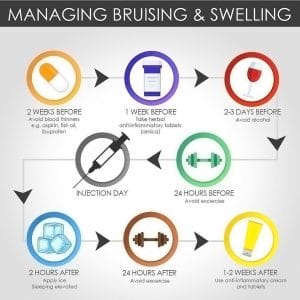Bruising After Filler Injections
According to experts, filler injections are safe. But common side effects include minor infection or bruising after filler injections. Before we discuss what causes bruising after filler injections, let’s discuss dermal fillers and their uses.
Dermal fillers can reduce wrinkles, plump your lips, and reshape your nose. These fillers contain substances like collagen and hyaluronic acid and can help enhance your looks. Currently, they are growing in popularity all over the world.
They’ve become popular holiday gifts. In the US, dermal fillers increased from 1.8 to 2.6 million procedures in 2010. Among these minimally invasive procedures, most are done safely. But as it gets popular, the number of complications has also increased.
Why is it done?
Dermal filler injections smooth wrinkled, scarred, or furrowed facial skin. Also, some help add fullness to your lips.
Depending on how you react to fillers and their target area, you might need more than one injection. Some dermal fillers don’t last long, while some do. As the body absorbs the filler slowly, your skin will return to its normal state. Consider the following:
- The effect of Restylane Juvederm lasts about 9 to 12 months
- The effects of Sculptra can start up to two years
- Research shows that the effects of Artecoll last about 5 years
- The effect of Radiesse or Calcium hydroxylapatite lasts about twelve months
Like all cosmetic treatments, you may or may not get the desired results.
What to expect after a dermal filler injection?
After the procedure, some complications include pain, swelling, redness, itching, and bruising. In this article, we will focus more on bruising. After a dermal filler procedure, you’ll notice bruising. Some research shows that it happens in about 19% to 24% of patients. But other studies state that the figure can be high as 68%.
The parts with the most visible signs of aging may bruise after the injections. They include the tear troughs, under the eyes, and the upper lips. If you need dermal fillers to lessen the look of wrinkles, marionette lines and nasolabial folds can bruise easily. Thankfully, there are a lot of things that can decrease the likelihood of this happening.

Products to avoid to reduce the risk of bruising after cosmetic injections
Some injections or fillers can result in more bruising than others. For instance, after filler injections, hyaluronic acid fillers like Perlane, Juvederm, and Restylane may likely cause bruising. Why? A medically certified injector of these fillers into the skin is also made of a thick substance. As for Botox, they may not cause bruising since they don’t go deep into the skin. Also, they cause less injury to your blood vessels. Before your procedure (2 weeks prior), watch your medications.
These medications can affect the way your body responds to dermal filler treatment. Some medications like anticoagulants and blood thinners prevent your blood from clotting. Also, it increases the possibility of bruising.
Before treatment, stop taking NSAIDs like Naproxen, Aspirin, Advil, Ibuprofen, Excedrin, and Motrin. If you have hemophilia or any life-threatening condition that requires you to take anticoagulants, talk with your dermatologists before undergoing filler treatments.
Further, some foods can affect your body’s reactions after dermal filler treatment. Before the procedure, avoid substances that act as natural blood thinners. Abstain from taking these supplements and products. The supplements have anticoagulant effects:
- Ginger
- John’s Wort
- Ginkgo biloba
- John’s Wort
- Ginseng
- Ginger
- Ginseng
- Ginkgo biloba
- Vitamin E
- Krill oil
- Green tea
- Fish oils and Omega-3
- Flaxseed oils
How to actively prevent bruising after cosmetic injections
Raise your Head
Many patients only elevate their heads for 2 to 4 days after treatment. There are no specific restrictions against lying flat after a dermal filler procedure. But most plastic surgeons suggest sleeping elevated. Elevating the head acts as a defence mechanism.
Also, it helps reduce blood flow to treated areas. It, in turn, reduces visible bruising and swelling. Sleeping in an uncomfortable (position isn’t necessary. You don’t need to do so to have an impact. Elevating your head further with another pillow can reduce bruising after filler injections.
Take Arnica
Gotten from a mountain flower, Arnica is a homeopathic medication. Holistic practitioners use it. They use it to treat muscle soreness, bruising, and other minor issues. Taking Arnica four to 4 days before your procedure and 4 days after may prevent bruising. You can place 4 homeopathic pills under your tongue twice daily.
Use a cold compress
Applying a cold compress can lessen bruising and pain one or two days after the procedure. Dr kamal (Ph.D. in Pharmacy) advises patients to place ice in a cloth or dip a washcloth in ice water. Afterward, they can apply it to the affected area. Don’t allow ice to come in contact with your skin, as it can lead to frostbite and discomfort.
Dye Plus Laser
At Albany Cosmetic and Laser Center, we use Dye pulse laser 585 nm 650 nm to remove bruising discoloration instantly. The results are satisfactory, with no downtime.
Bruising Management
Treating bruising depends on the body’s normal tendency to bruise. It takes about 2 weeks after treatment for the bruising to lessen. Although you need not worry about bruising, you must take some steps to prevent the bruising.
Don’t touch the treated area after the procedure (especially the first 6 hours). But you can apply the cream to reduce potential pain. Clean the area to prevent bacteria from getting into the treated site.
Yes, if you’re uncomfortable with the bruised spots, you can apply makeup to cover their bruises as much as possible. But be careful! Don’t press down with force. It can brush the area further. Also, your makeup may not cover the bruises completely.
Other things to consider before the injections
If you have simplex outbreaks or herpes, dermal filler injection may set off a flare-up. Also, If you have herpes, your doctor (or injection-certified pharmacists) will ask you to take an antiviral drug before the procedure. Each injection costs hundreds of dollars, depending on the filler type. Speak to your doctor about the costs and the number of injections you need.
